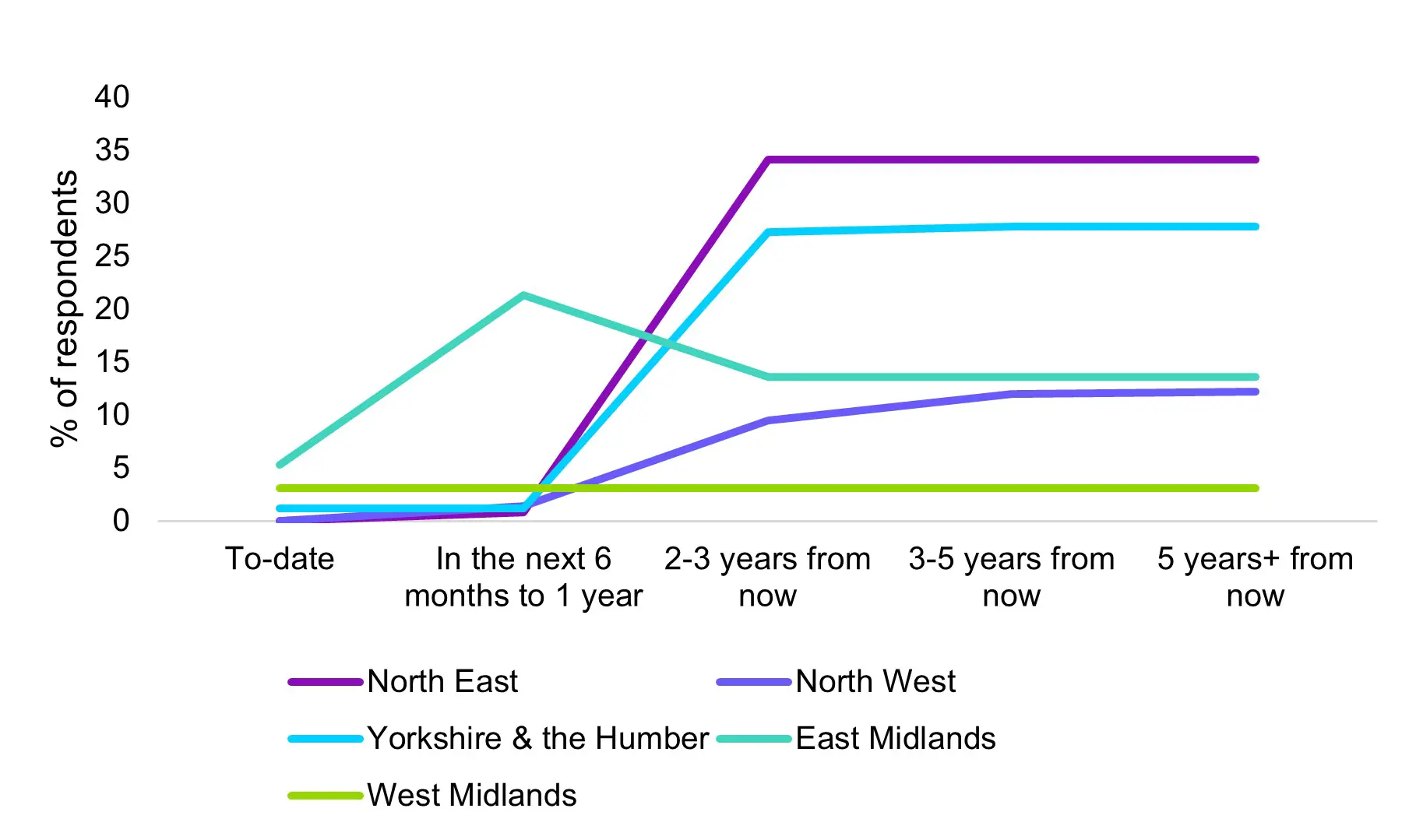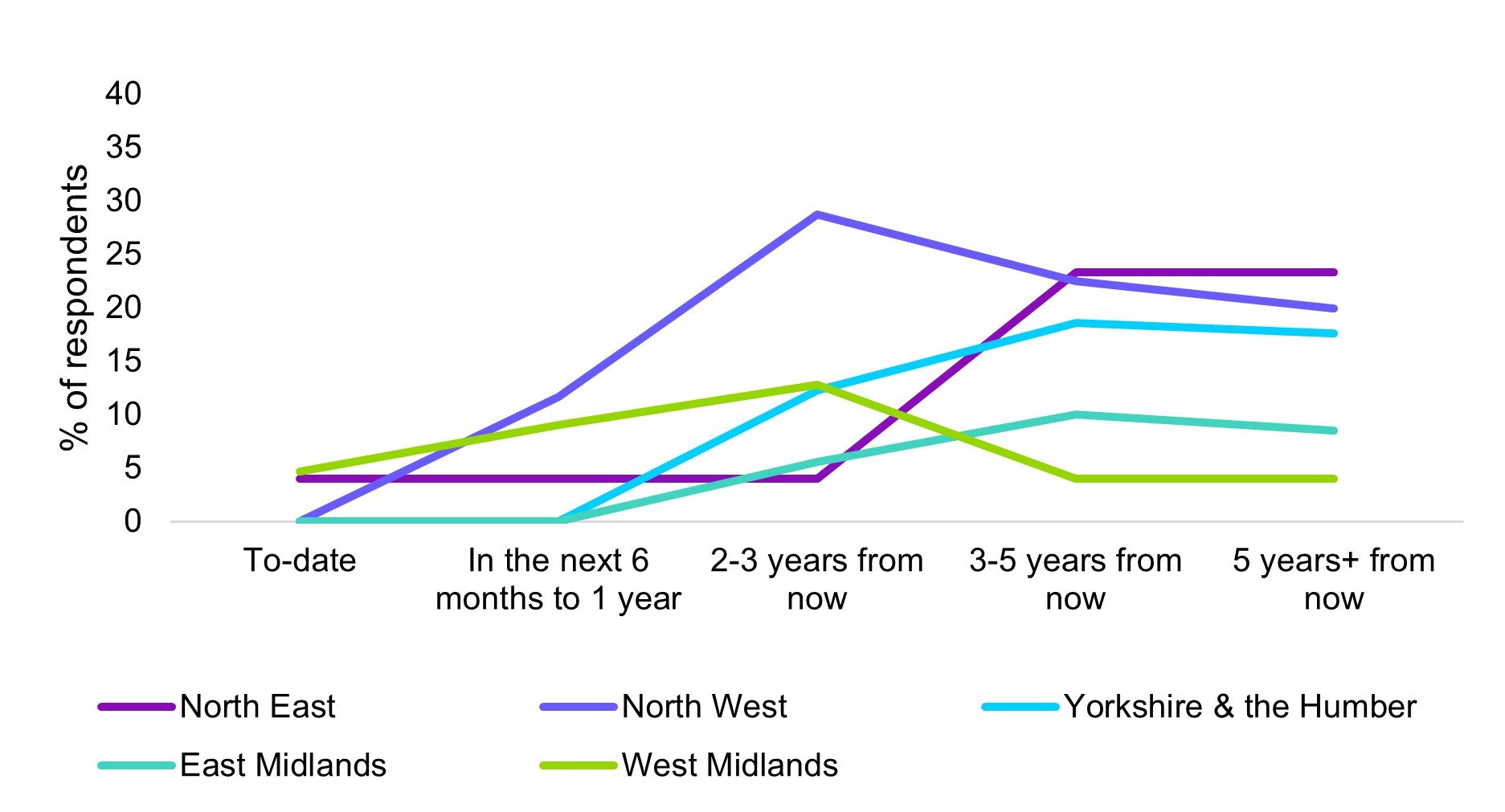Unwrapping our recent CBI Economics survey about the importance of long-term public investment in infrastructure.
11 Jun 2024, 6 min read
A long-term commitment from the government to invest in infrastructure is vital for sustainable business growth and economic development. Without it, the UK risks undermining its economic potential and losing credibility as a destination for global investment. The cancellation of the northern leg of the High-Speed 2 (HS2) rail project serves as a prime example of how wavering commitment can impact the economy.
A recent CBI Economics survey shows just how important long-term public investment in infrastructure is from a business perspective:
- Economic growth: 65% of respondents stated that high-speed rail connectivity is crucial for regional and national economic growth
- Time savings: 54% believe it significantly reduces travel time, enhancing productivity
- Global signal: 53% see it as a critical indicator of the UK’s commitment to modern infrastructure, potentially attracting international business investments
- Attractiveness to investment: 51% think high-speed rail is vital for drawing business investment.
The importance of long-term infrastructure investment
Infrastructure investment is a cornerstone of economic strategy. Consistent and sustained funding in this area sends a powerful message to businesses and investors about a country’s commitment to economic development.
According to the National Infrastructure Commission (NIC), long-term infrastructure plans are essential for addressing capacity and connectivity challenges, especially in regions that lag in development compared to major urban centres. The NIC stresses that growth strategies must persist over time to be effective. Unfortunately, short-termism has been a persistent issue in UK policy-making, evident in the abrupt cancellation of strategic projects like the HS2 rail project.
Long-term policy commitments and economic plans play a key role in enabling business investment and helping businesses navigate decisions with confidence.
High-speed rail: A catalyst for business investment and regional growth
A CBI Economics survey of more than 800 UK businesses across a range of sectors, business sizes and covering all UK regions indicates a strong belief in the importance of high-speed rail for economic growth. A net balance of 65% of respondents stated that high-speed rail connectivity is important, with 36% considering it “very important” for both UK and regional economic growth. These sentiments highlight a broader recognition of the strategic role of infrastructure investment in fostering a competitive and sustainable business environment.
Figure 1: Business opinion on the importance of high-speed rail connectivity and capacity (Source: CBI Economics survey, April 2024)
The perception of the benefits from high-speed rail varies regionally. Businesses in the North East, North West, and East Midlands are particularly likely to view it as essential for attracting investment. These regions have more patchy inter-city rail connectivity and thus stand to gain the most from improved infrastructure. Moreover, there is already evidence to suggest that the project has supported a development boom in Birmingham, with planning applications for new developments rising significantly. The same would have been expected for Manchester and Leeds, should the project have gone ahead.
HS2: A case study in missed opportunities
The cancellation of the northern leg of the HS2 rail project has sparked significant concern among UK businesses, particularly those in the North and Midlands regions. The HS2 project, originally envisioned to enhance high-speed rail connectivity across the UK, highlights the consequences of inconsistent infrastructure policies.

Figure 2: Business expectations around the impacts from the cancellation of HS2 (northern leg) on turnover (manufacturing firms, northern and midland regions) (Source: CBI Economics survey, April 2024)
Despite a majority of UK businesses anticipating no immediate impact on their revenue or headcount from the HS2 cancellation, there are significant concerns about future negative impacts. For example, 34% of manufacturing firms in the North East expect their turnover to be negatively affected within the next 2-3 years due to the project’s cancellation. Similarly, businesses in Yorkshire and the Humber and the North West foresee a decline in turnover as a direct result.

Figure 3: Business expectations around the impacts from the cancellation of HS2 (northern leg) on turnover (services firms, northern and midland regions) (Source: CBI Economics survey, April 2024)
Strategic and Long-Term Implications
The broader implications of the HS2 cancellation extend beyond immediate economic metrics. Business evidence suggests that long-term policy commitments give businesses the confidence to make investments. This sentiment is echoed by the NIC, which emphasises the need for a comprehensive, long-term plan to address capacity and connectivity challenges in city regions across the North and Midlands.
HS2 was not merely about speed but about freeing up capacity on other lines, reducing congestion, and facilitating freight movement. The project was expected to alleviate pressure on overcrowded networks and potentially take a million lorries off the roads.
The cancellation of the northern leg of HS2 therefore illustrates the detrimental effects of failing to maintain a long-term commitment to infrastructure investment. While immediate impacts on business turnover and investment decisions are mixed, the long-term strategic implications of this decision could undermine confidence in the UK’s transport strategy and economic future.
To foster a competitive and sustainable business environment, the UK must adopt a consistent and long-term approach to infrastructure investment.
About CBI Economics:
When you’re looking to make a business decision or investment, shift public perception or lobby a policy change – you need compelling evidence.
CBI Economics is your business’ economic consultancy, empowering you with the analysis you need to succeed. From bespoke surveys to policy recommendations, you’ll receive reports grounded in real-world impact that make stakeholders take notice and act.
Thanks to our unique understanding of business and policy, our highly accessible research offers you unparalleled influence within your organisation, with government and the media. Read the CBI Economics insights for the latest examples of our work.
Get in touch today to find out more about economic consultancy from CBI experts.

